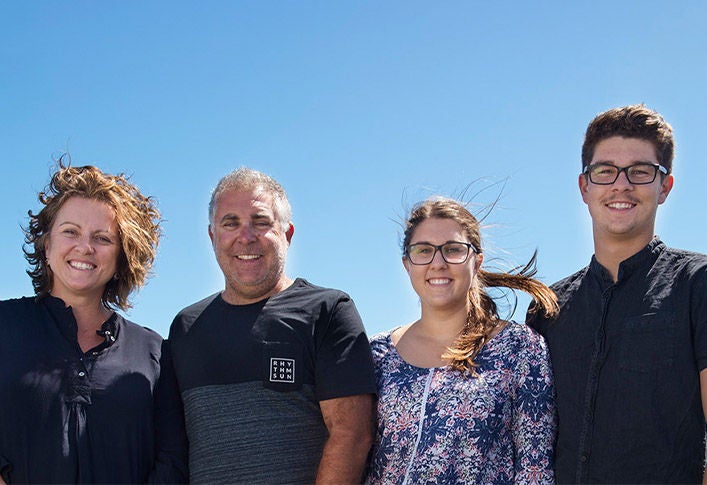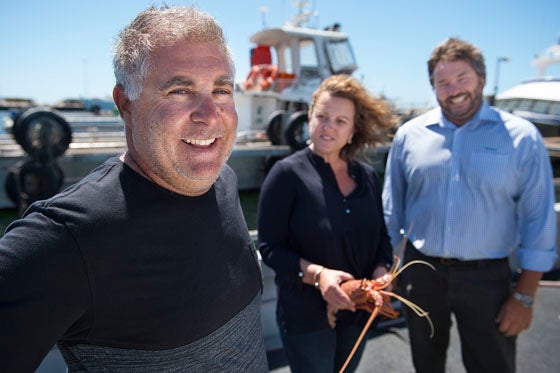Posted by on
12/05/2022
Growing up on a coral atoll 70km out in the Indian Ocean would be an unusual upbringing by most standards but for many kids born into Western Australia’s rock lobster industry it was nothing out of the ordinary. When Justin Pirrottina was growing up on the Arbolhros Islands in the 1970s there was a school and a pub on the islands supported by the approximately 200 vessels that used to operate in the area.
To ensure sustainability of the industry a quota was introduced to the West Australian Rock Lobster Fishery zone in 2010, greatly reducing the industry’s catch. Justin said while it has substantially changed the industry it has also been easy to see the benefits that have been provided through strict regulation. "There are now only around 50 vessels operating off the coast of Geraldton and while many of us still use a base on the islands during the season there are very few people who still live there permanently,” he said.
"There are now only around 50 vessels operating off the coast of Geraldton and while many of us still use a base on the islands during the season there are very few people who still live there permanently,” he said.
“The industry basically changed overnight with the new regulation, for 50 years we had been catching around 11,000 to 14,000 tonnes but the new quota was set extremely low at around 5,000 tonnes. Since then there has been a gradual increase in quota and stocks of rock lobsters are looking very healthy.”
“Overall the restricted catch has been beneficial for the industry, we’re catching less but receiving more money per kilo and having to do a lot less work.” The West Coast Rock Lobster Fishery was the first in the world to be certified as ecologically sustainable and in 2017 was re-certified.
A Chinese delicacy
Along with ensuring a healthy future for the industry the low quota has further increased the desirability of the crustacean among Chinese consumers.
“After the quota was introduced we saw demand from China skyrocket, but it has flattened out in recent years,” Justin said.
“Around 99 per cent of our catch is exported live into China with demand and price always spiking around Chinese New Year."
"While we have a 12-month fishing cycle, our peak season runs from the Chinese New Year through to the end of winter, when prices tend to be at their highest and kilos are easy to come by." Justin does admit that the reliance on the Chinese market, while profitable, does leave them exposed should any blocks in trade occur.
“Ideally we’d like to see the live lobster trade between Australia and China formalised through a free trade agreement to provide better security for the industry. We’ll also need to keep exploring alternative markets to ensure we are diverse enough to survive a shock to the Chinese market.”
By way of their own diversification, the Pirrottinas charter their boat ‘Apparition’ out for fishing and eco tours during seasonal down time and host everyone from keen anglers to snorkelers, bird watchers and of course history buffs interested in learning more about the Batavia shipwreck and mutiny.

A family affair
Justin and his wife Kylie run both the charters and the annual catch with only minimal requirements for additional staff. While daughters Ava and Essie are still studying, son Kit has been home for the last 12 months helping as a deckhand but is intending on heading to university at the end of the year.
Cray fishing has long been a family affair for the Pirrottinas with Justin’s father starting off in the industry some 50 years ago.
“I actually did a trade as a boilermaker and had no intention of getting into the family business, particularly as I get seasick, but here I am,” Justin said.
“We operated as a family unit with four boats between my father, two brothers and myself up until 2002 at which point we split up the business between the four parties.”
It was during this period of change for the Pirrottinas that they joined Rabobank after trying to find a bank that could simplify what they were trying to achieve.
“When it came to other banks, their plans for how to split up the business seemed to be overly convoluted,” he said.
“When we finally spoke to Rabobank, who were fairly new on the scene back then, they really made the whole process a lot easier and all four of us still bank with them.”
Looking to the future Justin said he would be potentially looking at investment options outside of the cray fishing industry.
“With none of the kids that keen to come back into the industry full time I think we’ll be on the look out for outside opportunities,” he said.
“We are in a very fortunate position with the value of the rock lobster industry in WA though and if prices continue to hold it provides a lot of security to know that there will be ongoing demand for pots to be leased by other boats.”
